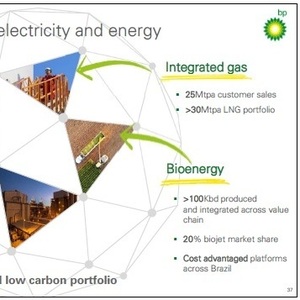BP net zero strategy features increased bioenergy production

August 5, 2020
BY Erin Krueger
BP on Aug. 4 announced a new strategy to transform from an international oil company focused on producing resources to an integrated energy company. As part of that goal, BP aims to become a net zero company by 2050.
Within 10 years, BP said it aims to have increased its annual low carbon investment 10-fold, to approximately $5 billion a year, building out an integrated portfolio of low carbon technologies, including renewables, bioenergy and early positions in hydrogen and carbon capture use and storage (CCUS). By 2030, BP said it aims to have 50 gigawatts (GW) of net renewable generating capacity in place, a 20-fold increase from 2019. The company also aims to increase its bioenergy production from 22,000 barrels per day to more than 100,000 barrels per day, including a 20 percent biojet market share.
Advertisement
Advertisement
Over the same period, BP’s oil and gas production is expected to fall by at least 1 million barrels per day, or 40 percent, when compared to 2019 levels. Refining throughout is expected to fall from 1.7 million barrels per day in 2019 to approximately 1.2 million barrels per day. The company said its remaining hydrocarbon portfolio is expected to be more cost and carbon resilient.
During a second quarter earnings call held Aug. 4, Giulia Chierchia, executive vice president of strategy and sustainability at BP, said the company plans to scale its bioenergy business, focused on biofuels, biogas and biopower. The target for 100,000 barrels per day will include advantaged coprocessing in BP’s refineries and third-party facilities, she added. “To this end, we plan to replicate our successful models of BP Bunge in Brazil and of biogas in the U.S. and leverage our biomass conversion technology, such as Fulcrum, which access cost-advantaged feedstock,” Chierchia said.
Advertisement
Advertisement
Chierchia also explained that in bioenergy, BP is aiming for 50,000 barrels per day by 2025 and will seek to grow its ethanol production through its Brazilian joint venture, BP Bunge Bioenergia, and refinery bio co-processing production.
Related Stories
CARB on June 27 announced amendments to the state’s LCFS regulations will take effect beginning on July 1. The amended regulations were approved by the agency in November 2024, but implementation was delayed due to regulatory clarity issues.
SAF Magazine and the Commercial Aviation Alternative Fuels Initiative announced the preliminary agenda for the North American SAF Conference and Expo, being held Sept. 22-24 at the Minneapolis Convention Center in Minneapolis, Minnesota.
Saipem has been awarded an EPC contract by Enilive for the expansion of the company’s biorefinery in Porto Marghera, near Venice. The project will boost total nameplate capacity and enable the production of SAF.
Global digital shipbuilder Incat Crowther announced on June 11 the company has been commissioned by Los Angeles operator Catalina Express to design a new low-emission, renewable diesel-powered passenger ferry.
International Air Transport Association has announced the release of the Sustainable Aviation Fuel (SAF) Matchmaker platform, to facilitate SAF procurement between airlines and SAF producers by matching requests for SAF supply with offers.
Upcoming Events










